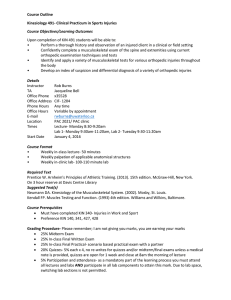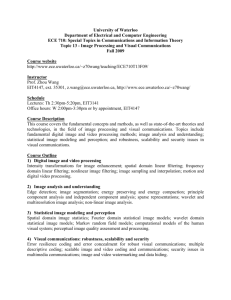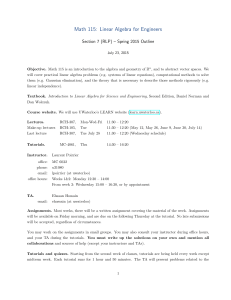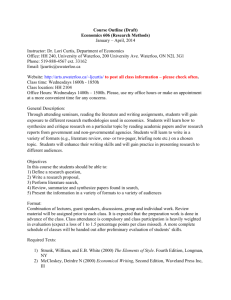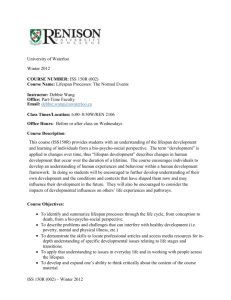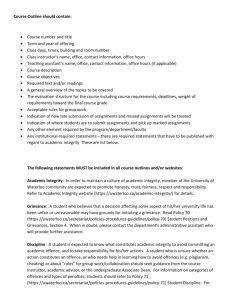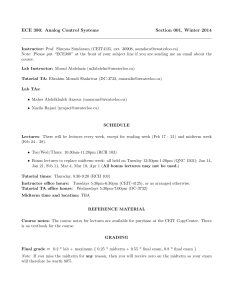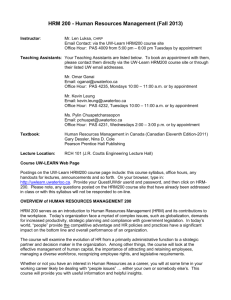RS 245-HIST 234 Syllabus_Fall 2013
advertisement
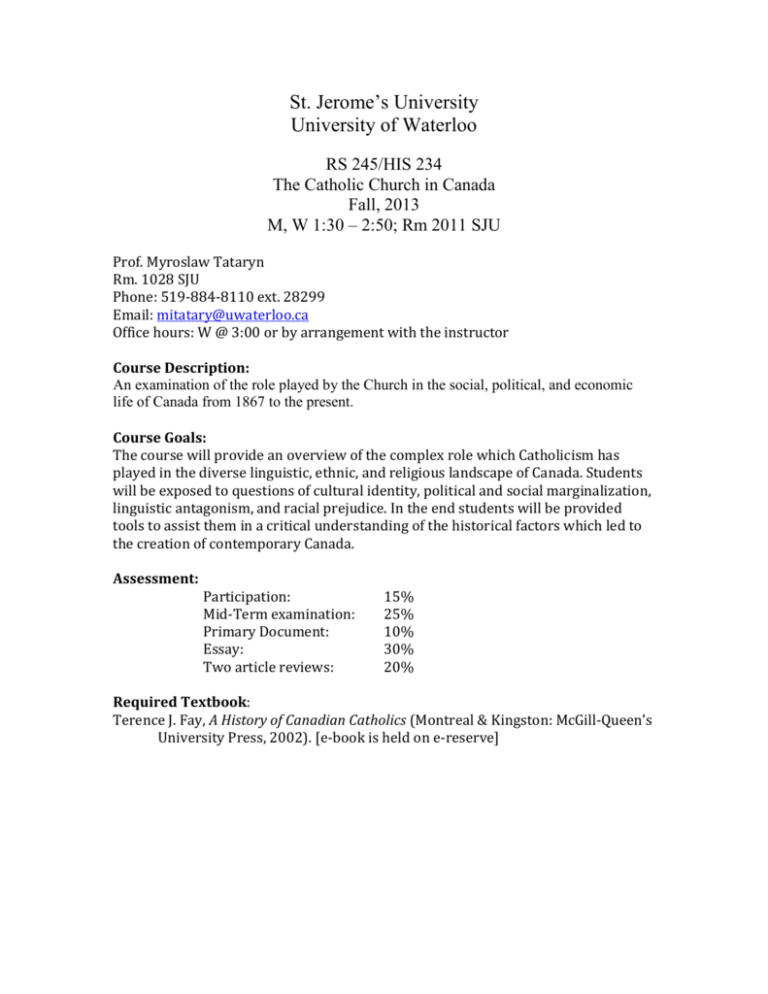
St. Jerome’s University University of Waterloo RS 245/HIS 234 The Catholic Church in Canada Fall, 2013 M, W 1:30 – 2:50; Rm 2011 SJU Prof. Myroslaw Tataryn Rm. 1028 SJU Phone: 519-884-8110 ext. 28299 Email: mitatary@uwaterloo.ca Office hours: W @ 3:00 or by arrangement with the instructor Course Description: An examination of the role played by the Church in the social, political, and economic life of Canada from 1867 to the present. Course Goals: The course will provide an overview of the complex role which Catholicism has played in the diverse linguistic, ethnic, and religious landscape of Canada. Students will be exposed to questions of cultural identity, political and social marginalization, linguistic antagonism, and racial prejudice. In the end students will be provided tools to assist them in a critical understanding of the historical factors which led to the creation of contemporary Canada. Assessment: Participation: Mid-Term examination: Primary Document: Essay: Two article reviews: 15% 25% 10% 30% 20% Required Textbook: Terence J. Fay, A History of Canadian Catholics (Montreal & Kingston: McGill-Queen’s University Press, 2002). [e-book is held on e-reserve] Week 1 (9 & 11.09): Methodology: How does a religion function in a society? 17th Century: a Church struggling with itself; Indigenous population: object of evangelization or to be ignored? French settlement: living on the Frontier Fay: 1-47; Review: http://www.civilization.ca/virtual-museum-of-new-france/introduction/ Week 2 (16.09): Excerpts from 1634 Relation of Fr. Paul le Jeune Gallicanism (reading history) The Conquest Week 2-3 (18 & 23.09): Ultramontane Catholicism: building a Catholic society French Canada the New France Fay: 48-119 Week 3 (25.09): 18th c the English in Canada Sept. 30: 1st article review due Week 4-5 (30.09 & 2, 7, 9.10): 19th Century: Diversity becomes complexity pre-Confederation Canada Confederation and the Anglicization project The Church and the West Fay: 120-151 16.10: Mid-Term Examination Week 7-9 (21, 23, 28.10): 20th Century: Catholic establishment & a Canadian Catholic Identity Catholics and the Canadian Left Antigonish Movement Catholic Social Teaching Fay: 155-277 Oct. 28: Primary document analysis due Week 9-11 (30.10 & 4, 6, 11, 13.11): 1960’s: Quiet Revolution, Vatican II – a (re)new(ed) Church? Fay: 278-302 Nov. 11: 2nd article review due Week 12-13 (18, 20, 25, 27.11-2.12): Addressing the legacy of Residential schools Contemporary challenges: social, political, internal Fay: 303-331; a look at contemporary documents. Dec. 2: essay due Academic Integrity In order to maintain a culture of academic integrity, members of the University of Waterloo community are expected to promote honesty, trust, fairness, respect and responsibility. See the UWaterloo Academic Integritity Webpage (https://uwaterloo.ca/academic-integrity/) and the Arts Academic Integrity Office Webpage (http://arts.uwaterloo.ca/current-undergraduates/academic-responsibility) for more information. Discipline A student is expected to know what constitutes academic integrity to avoid committing academic offenses and to take responsibility for his/her actions. A student who is unsure whether an action constitutes an offense, or who needs help in learning how to avoid offenses (e.g., plagiarism, cheating) or about “rules” for group work/collaboration should seek guidance from the course professor, academic advisor, or the undergraduate associate dean. For information on categories of offenses and types of penalties, students should refer to Policy 71, Student Discipline (http://www.adm.uwaterloo.ca/infosec/Policies/policy71.htm). For typical penalties check Guidelines for the Assessment of Penalties (http://www.adm.uwaterloo.ca/infosec/guidelines/penaltyguidelines.htm). Grievance A student who believes that a decision affecting some aspect of his/her university life has been unfair or unreasonable may have grounds for initiating a grievance. Read Policy 70, Student Petitions and Grievances, Section 4 (https://uwaterloo.ca/secretariat/policiesprocedures-guidelines/policy-70). When in doubt please be certain to contact the department’s administrative assistant who will provide further assistance. Appeals A decision made or penalty imposed under Policy 70, Student Petitions and Grievances (other than a petition) or Policy 71, Student Discipline may be appealed if there is a ground. A student who believes he/she has a ground for an appeal should refer to Policy 72, Student Appeals (http://www.adm.uwaterloo.ca/infosec/Policies/policy72.htm). Note for Students with Disabilities The Office for Persons with Disabilities (OPD), located in Needles Hall, Room 1132, collaborates with all academic departments to arrange appropriate accommodations for students with disabilities without compromising the academic integrity of the curriculum. If you require academic accommodations to lessen the impact of your disability, please register with the OPD at the beginning of each academic term.
